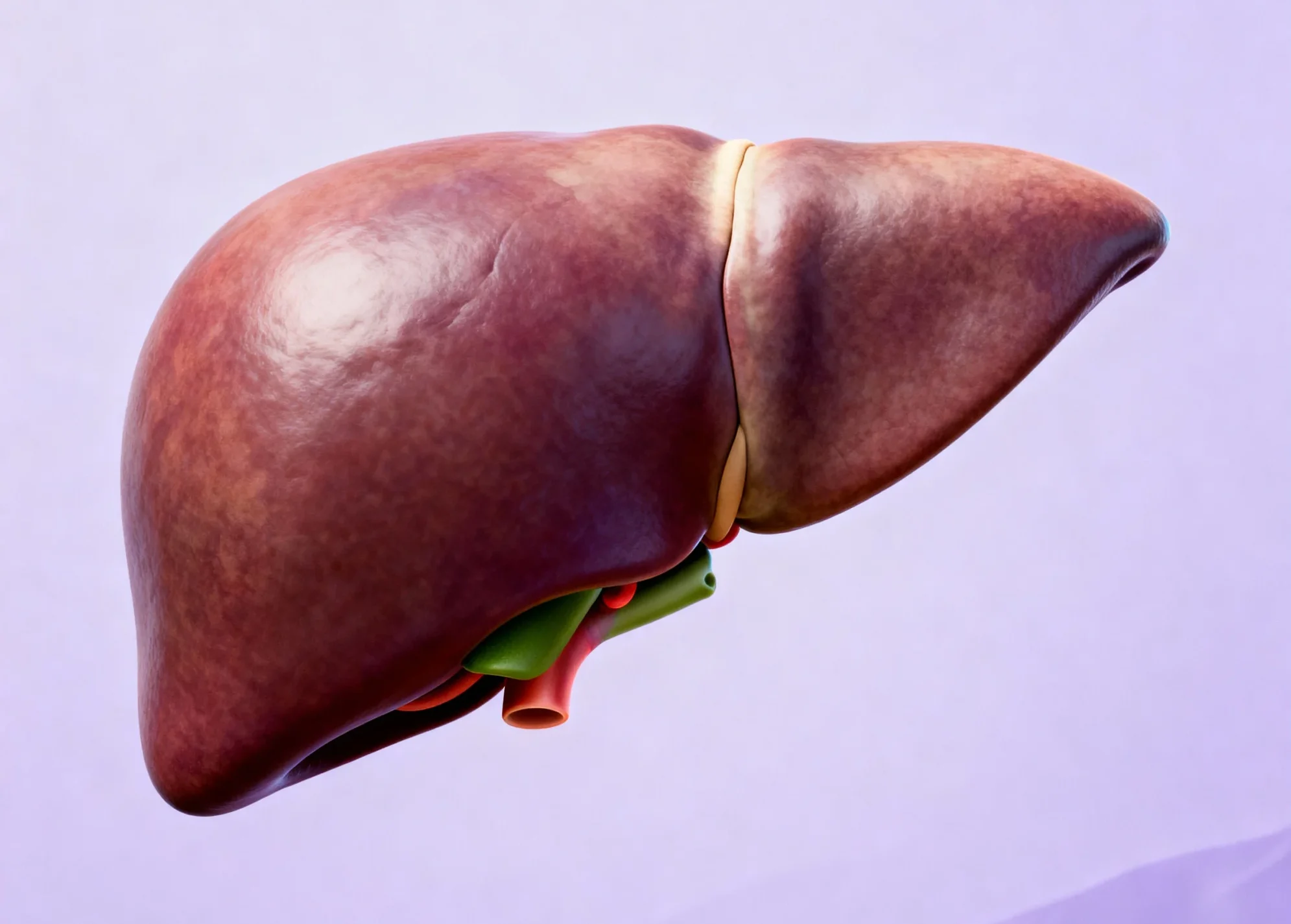MIND YOUR LIVER. IT NEEDS YOU. ™
Learning your liver is vital to your health. It’s your control center.

Your liver is your body’s largest solid organ and one of the most essential. It’s about the size of a football and sits just under your ribs on the right side. It quietly supports almost every major function in your body. It works to process nutrients, manage your energy supply, and clear out toxins & waste.
Every drop of blood leaving your stomach and intestines passes through the liver. It removes toxins, byproducts, and bacteria so they don’t build up in your system.
Your liver acts like a storage unit. Saving up energy (in the form of glucose), iron, and important vitamins like A, D, E, and K. It releases them when your body needs a boost.
Bile is a yellow-green fluid made by the liver. It breaks down fats in your small intestine, making it easier for your body to absorb key nutrients.
The liver breaks down everything from medications and alcohol to natural hormones and chemicals in food. This helps your body avoid overload or harm from built-up substances.
The liver makes proteins that stop bleeding and start healing. If your liver isn’t working well, even small injuries can take longer to stop bleeding.
The liver filters your blood, stores energy, breaks down substances, and supports your immune system—all at the same time. No other organ does this much in the background.
It stores vitamins and minerals, turns food into energy, filters toxins, breaks down alcohol and medications, and helps your blood clot when you’re injured.
The liver is one of the only organs that can rebuild itself. If part of it is damaged, the healthy tissue can grow back over time. Taking care of it early helps keep that ability strong and gives your body a better chance to recover if something goes wrong later.
Whether it’s restriction, binge eating, or purging, eating disorders can disrupt your body’s systems in ways that aren’t always visible. The liver—your body’s processing center—takes a direct hit.
This page is educational. It’s not a substitute for medical care. If you’re worried about your liver or have symptoms, talk to your provider. You deserve real answers and support.
Your liver connects to more than just digestion. It plays a role in how your body processes food, how your blood functions, and even how your hormones stay balanced.
The liver is a regulator. It doesn’t just do one job. It manages several systems at the same time. It helps your body stay stable by supporting energy levels, filtering blood, adjusting hormone levels, and storing nutrients. This helps your body respond to food, stress, and daily changes without losing balance.
The liver prevents dangerous highs and lows by storing and releasing glucose.
It manages how fats and cholesterol are used or stored in your body.
Your liver makes proteins your body needs for healing and blood flow.
It breaks down or recycles hormones to prevent imbalance.
It activates and stores nutrients so your body can use them when needed.
This page is educational. It’s not a substitute for medical care. If you’re worried about your liver or have symptoms, talk to your provider. You deserve real answers and support.
The liver isn’t doing all this alone. It’s part of a larger system, constantly working with other organs to keep things running smoothly. When the liver is healthy, it helps other organs stay balanced. When it’s struggling, the effects can show up in different parts of the body.
A healthy liver keeps toxins out of your bloodstream, which helps protect your brain. When the liver is damaged, those toxins can build up—leading to confusion, fogginess, or trouble focusing.
The liver helps you digest fats and absorb nutrients by making bile. If bile production slows down, digestion can get harder.
The liver and pancreas work together to help regulate blood sugar. If one is off, the other has to work harder to keep things stable.
The liver processes harmful substances before they reach your kidneys. When the liver is overloaded, your kidneys may take on extra strain.
The liver helps control fluid balance and blood pressure. Poor liver function can affect circulation and increase pressure in the blood vessels.
Liver damage doesn’t always stay in one place. It can affect your digestion, your energy, your focus, and your blood sugar. Your liver is tied into all of it. That’s why minding your liver is so important.
This page is educational. It’s not a substitute for medical care. If you’re worried about your liver or have symptoms, talk to your provider. You deserve real answers and support.
Your liver is doing more for you than you probably realize. It’s one of the most powerful organs in your body. It works 24/7 to keep things in balance. And yet, liver health is often not taken seriously until something goes wrong. That needs to change.
Liver conditions are becoming more common, especially among young adults. But most people don’t have symptoms until the disease is advanced. That’s why awareness, prevention, and regular check-ins are so important.
When your liver isn’t working well, it can affect your sleep, mood, focus, and overall quality of life. Liver issues can also increase your risk for serious complications like infections, bleeding, and organ failure if left untreated.
Many liver conditions can be slowed, reversed, or prevented entirely with early action. Supporting your liver through mindful lifestyle choices, regular care, and learning what to look for can make all the difference.
Your liver does a lot, which means a lot can affect it. Most liver problems don’t appear out of nowhere. They build up slowly and often without any symptoms at first. That’s why awareness and early action matter.
The liver can become inflamed due to infections, alcohol, toxins, medications, or immune system issues. Mild inflammation might not cause noticeable symptoms, but if it continues, it can start to damage liver tissue.
When fat accumulates in the liver, it can lead to fatty liver disease. This is often linked to weight, eating habits, insulin resistance, or alcohol use. It can be silent at first but lead to bigger problems if left unaddressed.
Ongoing damage can cause the liver to develop scar tissue. This is called fibrosis. Scar tissue makes it harder for the liver to do its job and can eventually interfere with important functions if it continues to spread.
Cirrhosis happens when there’s a lot of scar tissue and not much healthy liver left. It limits how well your liver can work. It’s a serious condition but manageable for some people with early diagnosis and the right care.
Liver failure is when the liver is too damaged to keep up with what your body needs. It can come on gradually or suddenly. But many cases can be prevented with early support and liver-friendly habits.
This page is educational. It’s not a substitute for medical care. If you’re worried about your liver or have symptoms, talk to your provider. You deserve real answers and support.

Your liver works hard for you, but it can only do so much without support.
There are simple, realistic ways to protect your liver and lower your risk of long-term damage.
From food and drinks to medications and environmental toxins, your liver processes everything you take in. Being more mindful about what you’re putting into your body helps reduce its load and gives it a chance to function at its best.
Even small amounts of alcohol can affect your liver over time. Cutting back makes a big difference. Especially if you’re drinking regularly or in larger amounts.
Some over-the-counter medications, supplements, and street drugs can be hard on your liver. So can untreated infections like hepatitis. It’s worth knowing the risks so you can avoid what you can and manage what you can’t.
Eating well, staying active, and maintaining a healthy weight all help reduce fat build-up and inflammation in the liver. These aren’t one-time fixes, they’re steady habits that help your liver keep up with everything it’s doing.
Liver disease often develops silently. Regular check-ups, blood tests, or even just talking to your doctor about your liver risk can help catch problems early, before they become serious.
This page is educational. It’s not a substitute for medical care. If you’re worried about your liver or have symptoms, talk to your provider. You deserve real answers and support.
Even small changes to how often or how much you drink can protect your liver long-term.
Some over-the-counter painkillers, supplements, and recreational drugs can cause liver strain when used too often or combined.
Movement and balanced nutrition help reduce liver fat and inflammation.
Blood tests, liver enzyme checks, and early hepatitis testing can catch problems before symptoms appear.
Your liver is connected to your hormones, digestion, and mood. Taking care of your mental health supports your liver too.
This page is educational. It’s not a substitute for medical care. If you’re worried about your liver or have symptoms, talk to your provider. You deserve real answers and support.
This page is educational. It’s not a substitute for medical care. If you’re worried about your liver or have symptoms, talk to your provider. You deserve real answers and support.
We use cookies to improve your experience on our site. By using our site, you consent to cookies.
Manage your cookie preferences below:
Essential cookies enable basic functions and are necessary for the proper function of the website.
You can find more information in our Privacy Policy and Privacy Policy.
